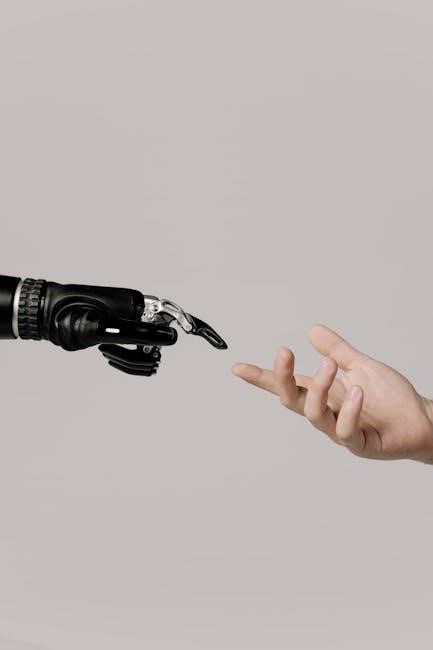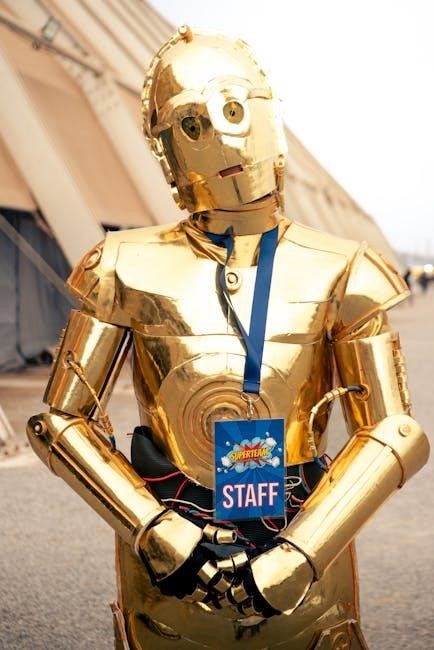Moonshot AI represents ambitious projects aiming to create smarter-than-human intelligence, pushing boundaries beyond current capabilities․ These initiatives, like those by OpenAI and MiniMax, define the future of AI innovation․
They focus on solving complex challenges, often inspired by visionary leaders like Alexandr Wang, who recently pursued building advanced AI systems․
Moonshot AI initiatives are characterized by their transformative potential, blending cutting-edge technology with strategic collaborations, as seen in Jony Ive’s hardware startup, io․
1․1 Definition and Scope of Moonshot AI Initiatives
Moonshot AI initiatives are defined as ambitious, large-scale projects aiming to achieve groundbreaking advancements in artificial intelligence․ These efforts focus on creating systems that surpass human intelligence in specific tasks, addressing complex challenges like disease diagnosis or climate modeling․ The scope includes developing general AI, enhancing hardware-software integration, and fostering interdisciplinary collaboration․ Recent examples, such as Alexandr Wang’s pursuit of smarter-than-human AI, highlight the transformative potential of these initiatives, blending innovation with societal impact․
Such projects often involve significant risks but promise revolutionary benefits․
1․2 Historical Context and Evolution of Moonshot Projects
Moonshot projects trace their roots to ambitious initiatives like the Apollo program and Google’s early “moonshot” philosophy․ In AI, these efforts gained momentum with advancements in machine learning and neural networks․Historically, milestones like DARPA’s AI investments and DeepMind’s AlphaGo victory marked significant progress․ Recent developments, such as OpenAI’s GPT models and MiniMax’s rise in China, reflect the evolution of these initiatives․ Moonshot AI now represents a global race to achieve transformative, smarter-than-human intelligence, building on decades of innovation and collaboration․
This evolution underscores the growing ambition and complexity of AI research․

Recent Advancements in AI Technology
Breakthroughs in AI technology include smarter-than-human systems, driven by innovators like Alexandr Wang․ OpenAI’s advancements and China’s MiniMax highlight rapid progress, reshaping the field․
These developments underscore the global race to achieve transformative AI capabilities․
2․1 Breakthroughs in Smarter-than-Human AI Development
Recent advancements in AI technology have focused on developing systems that surpass human intelligence․ Alexandr Wang has pursued ambitious projects to build smarter-than-human AI, marking a significant leap․
OpenAI and MiniMax are at the forefront, driving rapid innovation․ These developments highlight the global race to achieve transformative AI capabilities, aiming to redefine human-AI collaboration․
Such breakthroughs underscore the potential for AI to solve complex challenges, pushing the boundaries of what was previously thought possible․
2․2 The Role of Alexandr Wang in Pushing AI Boundaries
Alexandr Wang has emerged as a key figure in AI innovation, stepping down as Scale AI’s CEO to pursue his most ambitious moonshot yet․
His focus is on building AI systems that exceed human capabilities, reflecting a commitment to pushing technological frontiers․
Wang’s vision aligns with the broader goals of Moonshot AI initiatives, emphasizing the need for transformative advancements in the field․
His efforts highlight the importance of visionary leadership in driving AI progress and achieving groundbreaking results․

Key Players in the AI Moonshot Race
OpenAI, DeepMind, and MiniMax are leading the AI moonshot race, advancing frontier technologies and setting the pace for global innovation in AI development․
3․1 OpenAI’s Contributions to Moonshot AI Projects
OpenAI has been a pioneer in driving AI innovation through its moonshot projects, showcasing cutting-edge advancements in smarter-than-human intelligence․ The company recently made headlines with 12 livestreams over 12 business days, demonstrating its commitment to transparency and progress․ OpenAI has also been at the forefront of strategic collaborations, though its removal of mentions of Jony Ive’s hardware startup, io, from its website signals a shift in hardware partnerships․ Its focus on developing transformative AI models continues to set the pace for the industry, emphasizing ethical development and societal impact․
3․2 DeepMind’s Role in Advancing AI Frontiers
DeepMind has significantly advanced AI frontiers through groundbreaking research and innovation․ Known for developing systems like AlphaGo, which surpassed human expertise in complex games, DeepMind continues to push the boundaries of artificial intelligence․ The company focuses on creating generalizable AI systems capable of solving diverse, intricate problems․ By exploring neural networks and reinforcement learning, DeepMind aims to achieve smarter-than-human intelligence․ Its systematic approach to understanding intelligence and replicating it in machines positions it as a leader in the pursuit of transformative AI technologies․
3․3 MiniMax and China’s Growing Influence in AI
MiniMax, a prominent Chinese AI company, is at the forefront of China’s growing influence in artificial intelligence․ With advancements in AI research and development, MiniMax is challenging global leaders in the race for smarter-than-human intelligence․ The company’s focus on innovation and strategic collaborations underscores China’s commitment to becoming a key player in the AI moonshot race․ By leveraging homegrown talent and resources, MiniMax is driving technological progress that positions China as a formidable competitor in the global AI landscape․

Challenges and Risks Associated with Moonshot AI
Moonshot AI faces significant technical and ethical challenges, including creating smarter-than-human intelligence and addressing societal risks like job displacement and privacy concerns․
4․1 Technical Hurdles in Creating Smarter-than-Human AI
Developing smarter-than-human AI poses significant technical challenges, including achieving human-level reasoning and generalization․ Alexandr Wang’s ambitious moonshot aims to overcome these hurdles, pushing AI boundaries further․
Current systems struggle with contextual understanding and ethical alignment, requiring breakthroughs in algorithms and data processing․
Additionally, ensuring AI systems remain controllable and aligned with human values remains a critical technical challenge for researchers․
These obstacles underscore the complexity of creating AI that surpasses human intelligence while maintaining safety and reliability․
4․2 Ethical and Societal Implications of Advanced AI
Advanced AI raises profound ethical concerns, including job displacement, privacy erosion, and potential misuse․ As AI surpasses human intelligence, societal impacts like economic inequality and decision-making biases emerge․
There is a growing need for robust governance frameworks to mitigate risks while maximizing benefits․
Ensuring transparency, accountability, and fairness in AI systems is crucial to avoid exacerbating existing social issues․
Balancing innovation with ethical responsibility remains a cornerstone of Moonshot AI initiatives to foster trust and positive societal transformation․

Applications and Potential Impact
Moonshot AI promises transformative applications across industries, from healthcare to education․ Its potential to solve global challenges like climate change and disease is unprecedented․
These advancements could revolutionize how humanity approaches complex problems, fostering innovation and prosperity on a global scale․
5․1 Transformative Opportunities Across Industries
Moonshot AI offers groundbreaking opportunities across industries, revolutionizing healthcare, education, and finance․ In healthcare, advanced AI can enhance diagnostics and personalize treatments․
In education, smarter-than-human AI can create adaptive learning platforms, democratizing access to quality education․
Finance sees potential in AI-driven trading systems, optimizing investments and reducing risks․
Moreover, Moonshot AI can tackle climate change by optimizing energy consumption and predicting environmental patterns․
These innovations, driven by leaders like OpenAI and MiniMax, promise to redefine industry landscapes globally․
5․2 The Future of AI in Solving Global Challenges
Moonshot AI holds immense potential to address global challenges like climate change, food security, and healthcare crises․ Advanced AI models can optimize resource allocation and predict environmental trends․
In healthcare, AI could accelerate drug discovery and personalize treatments for diseases․
Leaders like Alexandr Wang and companies like OpenAI and MiniMax are driving these innovations, aiming to create impactful solutions․
By leveraging smarter-than-human intelligence, Moonshot AI initiatives could pave the way for a sustainable and equitable future, tackling complex global issues with unprecedented efficiency․

The Role of Hardware in Moonshot AI
Hardware advancements are crucial for Moonshot AI, enabling faster processing and scalability․ Jony Ive’s io and OpenAI’s shifting hardware partnerships highlight the importance of custom solutions for AI innovation․
6․1 The Significance of Jony Ive’s Hardware Startup, io
Jony Ive’s hardware startup, io, plays a pivotal role in advancing Moonshot AI by developing cutting-edge hardware solutions․ Its collaboration with OpenAI initially showcased the potential for custom-designed hardware to accelerate AI processing․
However, OpenAI’s recent removal of io mentions from its website signals a strategic shift in partnerships, underscoring the competitive nature of AI hardware development․
Ive’s reputation for innovative design, honed at Apple, brings a unique perspective to building systems that enable smarter-than-human AI, making io a key player in the Moonshot AI ecosystem․
6․2 OpenAI’s Shifts in Hardware Partnerships
OpenAI’s recent shifts in hardware partnerships highlight its evolving strategy to optimize AI performance․ The removal of Jony Ive’s io from its website suggests a strategic realignment, potentially toward more specialized hardware solutions․
This move underscores OpenAI’s focus on scalability and efficiency, critical for advancing Moonshot AI initiatives․
By exploring new hardware collaborations, OpenAI aims to maintain its competitive edge in the race to develop smarter-than-human AI, reflecting the broader industry’s emphasis on tailored infrastructure for next-generation AI systems․

Competitive Landscape and Rivalries
The AI race intensifies as OpenAI and MiniMax compete, with Alexandr Wang’s new venture and rapid product launches fueling innovation and rivalry in Moonshot AI advancements․
7․1 Intensifying Competition Between AI Companies
The competition in the AI sector has reached new heights, with companies like OpenAI and MiniMax leading the charge․ OpenAI recently made headlines with 12 consecutive livestreams, showcasing their advancements․ Meanwhile, MiniMax, a key player from China, is gaining recognition as a formidable contender․ Alexandr Wang’s decision to step down as Scale’s CEO to focus on smarter-than-human AI underscores the urgency and ambition driving these firms․ This rivalry is accelerating innovation, with rapid product launches becoming a hallmark of the race․
7․2 The Impact of Rapid Product Launches on Innovation
Rapid product launches in the AI sector are accelerating innovation, fostering a competitive environment․ OpenAI’s 12 consecutive livestreams and MiniMax’s emergence highlight this trend․ Alexandr Wang’s new venture exemplifies the push for smarter-than-human AI, driven by frequent releases․ While this pace fuels progress, it also intensifies pressure on companies to maintain quality and avoid burnout․ The dynamic nature of these launches underscores the industry’s relentless pursuit of advancement, reshaping the AI landscape at an unprecedented rate․

Ethical Considerations and Governance
Moonshot AI raises significant ethical concerns, including bias, privacy, and regulatory challenges․ Balancing innovation with responsibility is crucial to ensure AI benefits society responsibly and equitably․
8․1 Regulatory Challenges in Governing Moonshot AI
Regulating Moonshot AI presents significant challenges due to its rapid evolution and cross-border nature․ Governments face difficulties in creating frameworks that balance innovation with ethical oversight․
Current laws often lag behind technological advancements, leading to potential misuse․ International collaboration is essential to establish unified standards․
Additionally, the complexity of AI systems makes enforcement tricky, requiring adaptive and proactive regulatory approaches․
The dynamic landscape demands continuous policy updates and global cooperation to address risks effectively․
8․2 Balancing Innovation with Responsibility
Balancing innovation with responsibility is critical in Moonshot AI development․ Ethical considerations must guide advancements to prevent misuse and ensure societal benefit․
Stakeholders must collaborate to establish frameworks that promote transparency and accountability while fostering creativity․
Public trust hinges on responsible AI deployment, requiring ongoing dialogue between developers, policymakers, and society․
This balance ensures that Moonshot AI initiatives drive progress without compromising ethical standards or societal well-being․

Future Directions and Predictions
Moonshot AI is poised to redefine industries, with predictions of breakthroughs in smarter-than-human systems․ The next decade may see AI integrating deeply into societal fabric, driving unprecedented progress․
Collaboration between innovators, governments, and ethicists will shape its trajectory, ensuring responsible growth․ The future holds immense potential for AI to transform human capabilities and global challenges․
9․1 Predictions for the Next Decade in Moonshot AI
Over the next decade, Moonshot AI is expected to achieve unprecedented advancements, with smarter-than-human systems becoming a reality․ Alexandr Wang’s ambitious projects and Jony Ive’s hardware innovations signal a transformative era․
AI will likely integrate deeply into industries, solving complex global challenges․ Ethical frameworks will evolve to govern these advancements, ensuring responsible innovation․ The race between companies like OpenAI and MiniMax will drive rapid progress, reshaping human capabilities and societal structures․
By 2035, Moonshot AI could redefine industries, from healthcare to education, creating a future where AI and humanity collaborate seamlessly․
9․2 The Potential for AI to Redefine Human Capabilities
Moonshot AI holds the promise to redefine human capabilities by enhancing creativity, problem-solving, and decision-making․ Advanced AI systems could augment human intelligence, fostering breakthroughs in science and education․
Collaboration between humans and AI may unlock unprecedented innovations, reshaping industries and societal norms․ However, ethical considerations must guide this evolution to ensure AI complements human potential responsibly․
The integration of smarter-than-human AI could empower individuals and organizations, creating a future where human and artificial intelligence coexist harmoniously, driving progress and addressing global challenges effectively․
Moonshot AI represents a transformative journey, blending innovation, collaboration, and responsibility․ As initiatives like OpenAI and MiniMax push boundaries, the future holds immense potential for AI to redefine human capabilities․
The rapid evolution of AI, driven by visionaries like Alexandr Wang and advancements in hardware, underscores the need for ethical governance․
Balancing innovation with responsibility will be crucial․ Moonshot AI’s impact will depend on how humanity navigates its development, ensuring a future where AI enhances rather than overshadows human potential․
